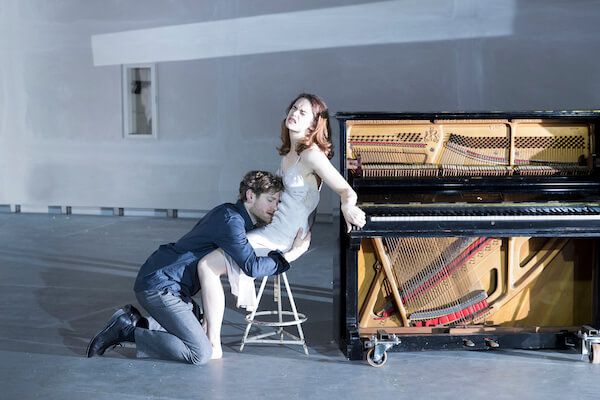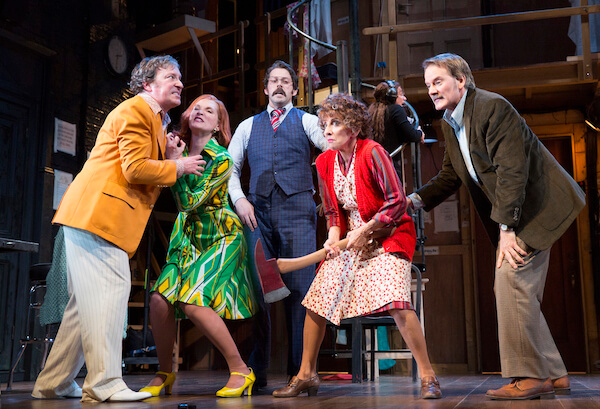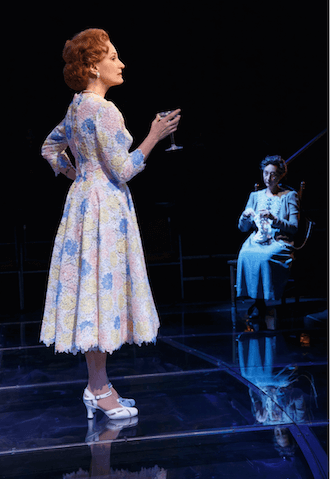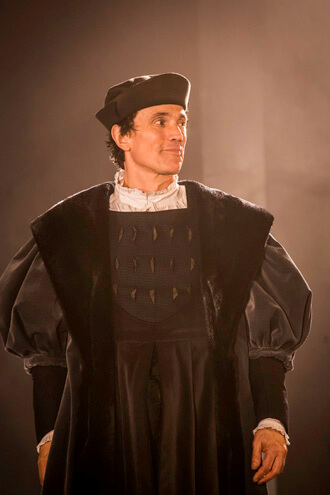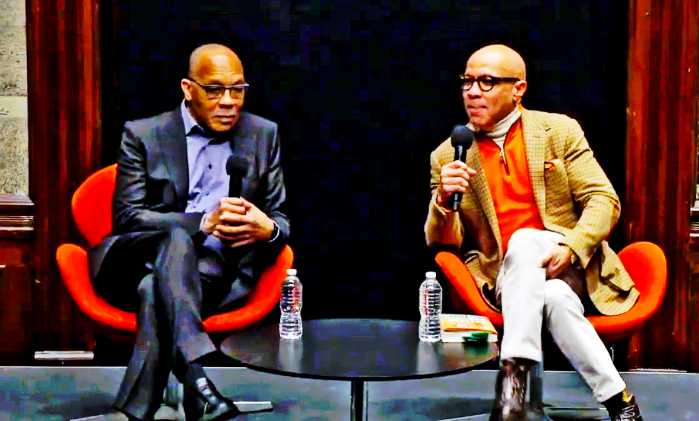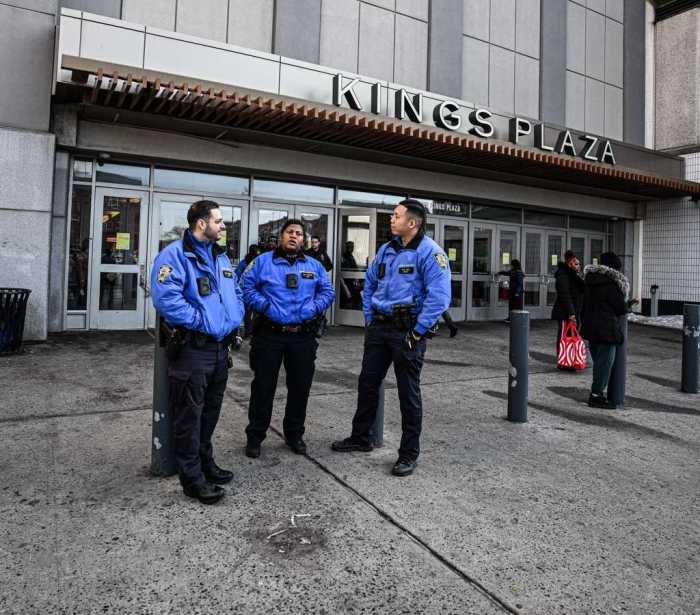Darcey Brown, Janet Etuk, and Bobby Stallwood in Alexander Zeldin’s “Love.” | SARAH LEE
Chris Hedges, the reporter who is trying to restore Western civilization’s conscience, just wrote that in the wake of the election debacle, “We will endure by holding fast to our integrity, by building community, and by spawning new institutions in the midst of the wreckage.” In this bleakest of winters, that sobering truth come to dramatic life at the National Theatre’s Dorfman in the unlikeliest of places — a “home” not even as cozy as Bob Cratchit’s on a bad day.
Alexander Zeldin’s “Love” (to Feb. 11) plops us in a hostile, fluorescent-lit hostel for disparate displaced families sharing one bathroom as they await judgments from unforgiving poverty bureaucracies as to whether they will ever be allowed to leave this limbo for real homes. The house lights are up the whole hour and three quarters with no intermission, making it harder to look away and easier to see the reactions of the well-dressed, well-fed witnesses to their plights.
Zeldin, who also directs, doesn’t make it easy for us. There is little in the way of theatrical heightening as he just lets the days of the unlucky unfold. There is no false hope for the old, incontinent white woman cared for by her obese son, the interracial couple with two young kids “living” in one room, the Islamic young man who drifts in and out, the refugee woman who mostly keeps to herself. But they each have their dignity – and each other – in a situation beyond the imagining of most of us. Their mere survival is profoundly moving.
None of the performances strikes false notes that would distract from the reality that Zeldin hopes we will face. A wonderful gift for Christmas when we are supposed to be recalling a homeless family stuck in a stable for the birth of their child and as the US heads for the biggest downward spiral for the poor since the Depression.
“Much Ado About Nothing” at the Haymarket is subtitled by the Royal Shakespeare Company “Love’s Labour’s Won” (in repertory with “Love’s Labour’s Lost” to Mar. 18), and it does make you believe love can overcome. A lot. It is a “comedy” where the threat of an honor killing hangs over the proceedings, but the splendid company makes it seem effortless – swinging from slapstick to romance to dark tragedy.
Christopher Luscombe sets his “Ado” after World War I and “Downton Abbey” will come to mind, but he proves the tale timeless. Edward Bennett and Lisa Dillon are perfect as an evenly matched Benedick and Beatrice. (Bennett does something with a Christmas tree I’ve never seen done before.) And Steven Pacey is an especially fine Leonato morphing from the bland, proud dad of lovely Hero to being ready to dispatch her in a rage from the land of the living.
Adam Gillen and Lucian Msamati in Michael Longhurst’s revival of Peter Shaffer’s “Amadeus. | MARC BRENNER
But all beliefs in love and talent overcoming baser qualities are shattered in the temple of the National’s Olivier in Michael Longhurst’s provocative revival of Peter Shaffer’s “Amadeus” or “Salieri, your arms too short to box with God.” I normally would not comment on “non-traditional” casting, but Salieri is played by Lucian Msamati, Emperor Joseph II’s lackluster court composer – not just a black man but one wearing a black wig amidst a sea of white ones as he is devastated by the genius of Mozart (Adam Gillen, who captures both his divine spark and infantile temperament in an eye-popping turn) and seeks to destroy him in a rage at his God for speaking through this vulgar manchild and not him.
Salieri asks, “The death of Mozart: Did I do it?” with echoes of O.J., who murderously rebelled against the white court that promoted him as a black man to look up to. This epic production – woven with sublime music and a sprinkling of thought-provoking anachronisms – is a keen reimagining of the 1979 play most known for the 1984 Milos Forman movie.
As a stage work once more, we are riveted by the contemplation of the mysteries of Salieri’s epic envy and Mozart’s unfathomable gifts. It put me in mind of the confounding election we just endured where the motivation of many voters seemed to be: if I can’t have my status back, I’d be happier if those who have achieved some lose it – especially those like gays and liberated women who offend the God I have devoted my life to worshiping and people of color who “don’t know their place.”
If you cannot get to the Olivier by Feb. 2, the National’s “Aamdeus” will play in cinemas worldwide from then on via NT Live.
Ashley Shaw in Sir Matthew Bourne’s new “The Red Shoes.” | HUGO GLENDINNING
Another tale of destructive envy is brought to lushly romantic life in Sir Matthew Bourne’s new “The Red Shoes” at Sadler’s Wells (to Jan. 29), based on Hans Christian Andersen’s fairy tale and the classic Michael Powell-Emeric Pressburger 1948 film.
As the enjoyment of “Amadeus” is enhanced by Mozart’s music, “The Red Shoes” enchants us with excerpts from stirring scores by Bernard Hermann from films such as “Citizen Kane” and “Fahrenheit 451” arranged by Terry Davies and Bourne’s thrilling choreography that propels this backstage story to its tragic conclusion — lightened by high and low ballet sequences and unobtrusively integrated heterosexual and homosexual pairings. Kudos to the principal dancers, rotated among the three leads. I saw Ashley Shaw as Victoria Page, Chris Ternfield as Boris Lermontov, and Dominic North as Julian Craster.
And while this “Amadeus” and “Red Shoes” were surely dreamed up before the Trump ascendancy, the bad guys in both luxuriate in overly gilt rooms.
Sally Cookson and her energetic Companies troupe, who worked a theatrical miracle with “Jane Eyre” last season, are back with a new version “Peter Pan” also at the Olivier (to Feb. 4). Madeleine Worrall, who shone as Jane, is a nicely motherly Wendy. There is merit in making Paul Hilton’s Peter an aging rock star (many of whom are lost boys) and keeping us off balance by turning Anna Francolini’s Mrs. Darling into Captain Hook. But using adult actors to play children of all ages works less well here – despite calling to mind the massive rebellion against growing up manifest in the regressive votes for Brexit and Trump. But “Pan” is already a story of wonder, less suited for the Companies treatment of making us look at more serious tales with wider eyes.
Anna Francolini as Captain Hook – she’s also Mrs. Darling – in Sally Cookson’s production of “Peter Pan.” | STEVE TANNER
I was not a fan of hot young director Robert Icke’s “1984” which went from the Almeida to being a long-running hit in the West End. And his vision of David Hare’s “The Red Barn” (to Jan. 17) adaptation of a George Simenon mystery at the National’s Lyttelton left me cold and not just from the stage blizzard and creepy goings on in the 1969 Connecticut exurbs. It does have another strong performance from Mark Strong — so good in Ivo Van Hove’s “A View from the Bridge” last season on Broadway – as the sexually frustrated husband, Donald, of chilly spouse Ingrid (Hope Davis). He tries to break out of his fevered cabin by running off to languid Mona (Elizabeth Debicki).
Icke’s bells and whistles – mostly a shifting scrim that opens and closes like an iris – don’t add much to the fact that there isn’t much there there theatrically that isn’t available on a daily soap. I’d still go to anything Hare writes or that these actors perform, but there was less here than met the director’s eye.
Back at the Almeida, however, where Icke is associate director, he has staged a sensational new adaption of Friedrich Schiller’s 1800 “Mary Stuart” (to Jan. 21). It may sound gimmicky to let a coin toss determine which role the lead actors will take on, but it draws the audience into the tension in this battle royal from the moment the lights go down.
Lia Williams as Elizabeth and Juliet Stevenson as Mary in a new adaption of Friedrich Schiller’s “Mary Stuart.” | MANUEL HARLAN
I saw Juliet Stevenson as Mary and Lia Williams as Elizabeth and despite an almost three-hour playing time, these marvelous actors cleave us to the life-and-death struggle between them aided by an outstanding cast of courtiers: John Light as a sexy Leicester, Alan Williams as humane Talbot, Vincent Franklin as Burleigh, fierce pusher of realpolitik, and Rudi Dharmalingam as Mortimer, whose alternating passions for these crowned heads always leaves us guessing – despite knowing how this tragic tale will turn out.
Netflix’s fine “The Crown,” about Elizabeth II, is weak tea compared to the intrigue and muscular combat in this. “Mary Stuart” is dense with ideas, many of them timely and not just because it is performed (mostly) in modern dress. Mary proclaims, “I came to England as a refugee!” Talbot warns, “No one’s head is safe if Mary Stuart loses hers.” And Elizabeth laments, “To serve your people is to be a slave.” As the actors spun about the round playing area, my head was spinning with thoughts about the peril of our fragile globe.
Kyle Soller and Ruth Wilson in Ivo Van Hove’s modern dress production of “Hedda Gabler.” | JAN VERSWEYVELD
Director Ivo Van Hove – out gay and always out there – transformed “A View from the Bridge” on Broadway and is on to a modern dress “Hedda Gabler” in a new version of Ibsen’s 1890 play by Patrick Marber at the National’s Lyttelton (to Mar. 21 and NT Live in cinemas).
Ruth Wilson (of HBO’s “The Affair”) is troubled Hedda and Kyle Soller her feckless husband Tesman, with Rafe Spall as Brack making a bad marriage worse and Chukwudi Iwuji as the idealistic Lovborg. Setting it in the present day may be intended to show that many women are still trapped by men even in the West. (How, after all, could all those women have voted for President Pussy Grabber?) Hedda’s suicide could be seen as a radical response to her circumstances, but it is hard to pull off theatrically and there are some unintended laughs here rather than shocks.
James Graham’s “This House,” a sprawling political story of the Labour parliaments of the 1970s in Britain and what had to be done by party whips to hang on to power by miniscule margins, started life at the National and is now wowing them at the Garrick Theatre (to Feb. 25) in this season of discontent with all things governmental. Yet “This House” is packing them in and entertaining brilliantly as it informs. The political machinations are often hilarious and sometimes impressive in the Labour efforts to forestall the ascendancy of the unseen Thatcher.
Would that there was this much interest in America in how power actually works. We might not be in the situation we are in. Jeremy Herrin directs again with a mostly new ensemble led by the men playing the deputy whips – Phil Daniels (reprising his role as Labour’s Bob Mellish) and Nathaniel Parker (new as the Tories’ Jack Weatherill). They achieve a moving grace note by show’s end.
Simon Callow is spending the holidays reprising his one-man “Christmas Carol,” at the Arts Theatre (to Jan. 7), embodying all the characters in that enduring tale of redemption in an hour and 20 minutes – something Dickens himself did soon after publishing it in 1843. (I kept yearning for the spirits to haunt Trump before he is inaugurated, but he may be a harder crab to crack than Scrooge.)
I caught the first London revival in 80 years of Rodney Ackland’s “After October” (now closed) at the Finborough pub theater that rescues quite wonderful properties much the way New York’s Mint Theatre does. Struggling playwright Clive Monkhams (Adam Buchanan) toils away in a decidedly un-posh Hampstead basement flat surrounded by family and hangers-on who need him to succeed for their own sakes. The audience shared their close quarter as Oscar Toeman directed. A non-nostalgic trip back to the 1930s – where we may all be headed once more unless we stick together.
COMING UP: Tom Stoppard’s “Travesties” with Tom Hollander at the Menier Chocolate Factory (Feb. 3-Apr. 29). Imelda Staunton and Conleth Hill are in Albee’s “Who’s Afraid of Virginia Woolf?” at the Harold Pinter Theatre (Feb. 22–May 27). The Old Vic has Stoppard’s “Rosencrantz & Guildenstern are Dead” (Feb. 25-Apr. 29) with Daniel Radcliffe, then John Boyega, the new “Star Wars” star, is doing “Woyzeck” (May 6-Jun. 24), followed by a new musical written and directed by Conor McPherson, “Girl from the North Country,” with music and lyrics by Nobel Laureate Bob Dylan (July 12-Oct. 7). David Tennant stars in Patrick Marber’s new “Don Juan in Soho” (Mar. 17-June 10) at Wyndham’s. There is great anticipation for Marianne Elliott’s May revival of Tony Kushner’s “Angels in America” at the National with Nathan Lane, Andrew Garfield, James McArdle, and Russell Tovey.

